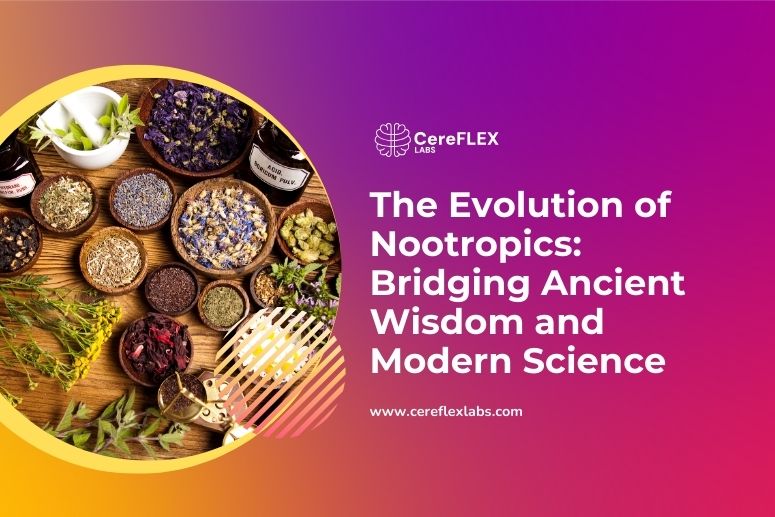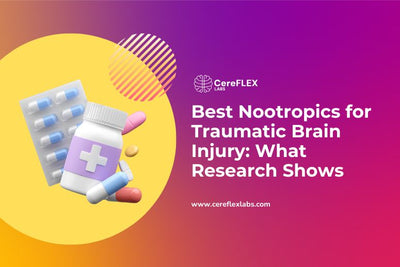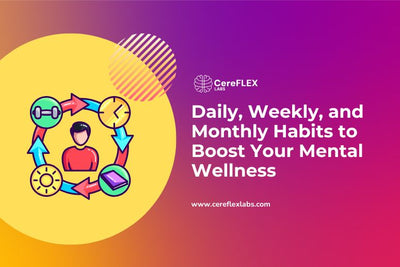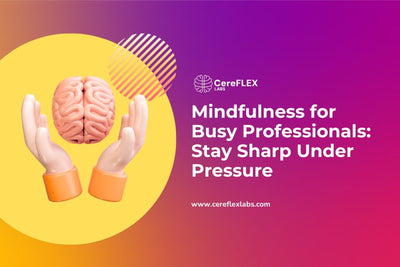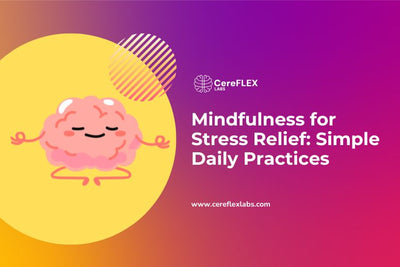Throughout history, people have sought ways to enhance thinking, memory, and focus, leading to the development of various nootropics for mental clarity. From ancient herbal remedies to modern lab-engineered compounds, the pursuit of better brain function has continuously evolved.
In ancient times, scholars and healers relied on Ginkgo Biloba, Bacopa monnieri, and Rhodiola Rosea to support mental clarity and memory. These natural substances laid the foundation for what we now call nootropics—compounds that enhance cognitive function.
The modern era of cognitive enhancers began in 1972 when Romanian chemist Corneliu E. Giurgea synthesized Piracetam, coining the term nootropic to describe substances that improve brain function with minimal side effects.
Today, nootropics have gained mainstream popularity among students, professionals, and biohackers looking to boost memory, focus, and productivity. But how did this journey unfold? What insights can we gain from history, and what does the future hold for cognitive enhancement?

What are the origins of nootropics?
Long before modern pharmaceuticals, ancient civilizations turned to nature to enhance mental clarity, memory, and focus. Across cultures, certain plants and herbs were highly valued for their ability to support brain function and cognitive health.
These early remedies laid the groundwork for what we now call nootropics, influencing traditional medicine practices that continue to shape modern cognitive enhancement strategies.
Ancient Use of Herbs and Natural Substances for Cognitive Enhancement
For thousands of years, cultures across the world have turned to natural substances to support memory, focus, and cognitive resilience. From Traditional Chinese Medicine and Ayurveda to Arabian and Viking traditions, the pursuit of cognitive enhancement has shaped both historical healing practices and modern research.
Traditional Chinese Medicine (TCM)
Traditional Chinese Medicine has emphasized brain health for over 5,000 years. It integrates herbal cognitive enhancers, dietary therapy, and holistic practices like Qigong.
Polygala tenuifolia has long been used to improve memory and reduce stress, while lion’s mane mushroom supports nerve growth and may protect against brain degeneration. Reishi Mushroom is another staple, valued for boosting immunity and promoting mental calmness.
Beyond herbs, TCM incorporates acupuncture and pulse diagnosis to identify mental imbalances, reinforcing the belief that cognitive health is closely linked to overall well-being.

Ayurveda: India’s Ancient Cognitive System
Ayurveda, one of the world’s oldest medical systems, takes a mind-body-spirit approach to health. It identifies Medhya Rasayanas, a class of herbs known for enhancing cognitive function.
Bacopa monnieri (Brahmi) is a powerful memory booster, while Acorus calamus (Vacha) improves speech and mental clarity. Clitoria ternatea (Shankhpushpi) enhances learning and recall, and Nardostachys jatamansi helps calm the nervous system. Terminalia chebula (Haritaki) is used to support brain detoxification and longevity.
In addition to herbal remedies, Ayurveda incorporates dietary and lifestyle recommendations to maintain long-term cognitive health.

Arabian Contributions: Coffee & Khat
The Arabian Peninsula has a long history of using stimulants for mental clarity. Coffee, first cultivated in Yemen in the 15th century, was used by Sufi mystics to maintain wakefulness during meditation. It later became a popular beverage in intellectual and social circles worldwide.
Khat, another widely used plant, contains cathinone, a stimulant known for enhancing focus and social interaction. While khat has been culturally significant for centuries, it remains controversial due to potential health concerns.
Egyptian and Sumerian Contributions
Ancient Egyptians and Sumerians explored plant-based cognitive enhancers for both medicinal and spiritual purposes.
Egyptians used the lotus flower in rituals for its psychoactive effects and valued the opium poppy for pain relief and altered mental states. The Ebers Papyrus, one of the oldest medical texts, documents various cognitive-enhancing remedies.
Sumerians also experimented with psychoactive plants. Mandrake was known for its sedative properties, while the fly agaric mushroom was used in religious ceremonies to induce cognitive expansion.
Ancient Greek Practices: Herbal Support for Wisdom
The Greeks placed immense value on knowledge and intellectual strength. Many ancient scholars used plant-based remedies to support cognitive function.
Rosemary was believed to improve memory, and Greek sage and spearmint were valued for their brain-boosting compounds. Physicians like Hippocrates and Galen emphasized the role of diet and lifestyle in maintaining cognitive health.
Viking Use of Rhodiola Rosea
Vikings relied on Rhodiola Rosea to maintain stamina and mental clarity in harsh conditions. This adaptogenic herb was used to combat fatigue, enhance endurance, and improve focus during long journeys.
Modern research confirms that Rhodiola supports cognitive function, resilience to stress, and sustained energy levels, validating the traditional Viking practice.
The Birth of the Term ‘Nootropic’
In 1972, Romanian chemist Corneliu E. Giurgea coined the term "nootropic" while developing Piracetam, the first synthetic cognitive enhancer. His research showed that Piracetam improved memory, learning, and cognitive function without sedation or overstimulation.
To define this new class of brain-enhancing substances, Giurgea combined the Greek words "nous" (mind) and "trepein" (to bend or turn). His work laid the foundation for modern nootropics, shaping research on cognitive enhancement and smart drugs.
The Evolution of Synthetic Nootropics
Synthetic nootropics emerged in the 1960s with Piracetam, a GABA-derived compound designed to enhance brain function without sedation or stimulation. Researchers found it improved memory, learning, and adaptability, leading to its use in dementia and Alzheimer’s treatment.
Piracetam’s success spurred the development of racetam nootropics, each with unique cognitive benefits. Oxiracetam enhances memory and learning, Aniracetam boosts focus and mood while reducing anxiety, and Pramiracetam sharpens recall and problem-solving by increasing choline uptake.
Advancements soon expanded beyond racetams. Modafinil, noopept, and synthetic peptides introduced new approaches to cognitive enhancement, productivity, and neuroprotection. Once experimental, synthetic nootropics now drive a growing industry focused on optimizing brain function.
The Science Behind Nootropics Today
Advancements in brain research, biohacking, and cognitive science have driven significant progress in nootropic development. Current studies explore the effectiveness, safety, and long-term impact of both natural and synthetic cognitive enhancers on memory, focus, learning, and brain health.
Researchers are investigating whether nootropics can enhance cognitive function beyond natural limits, improve neuroprotection and anti-aging, and reduce the risks of long-term use. Another key focus is bioavailability and stacking strategies, determining which combinations yield the most benefits with minimal side effects.
These ongoing studies continue to shape the expanding market for cognitive enhancers, paving the way for personalized nootropic formulations designed to meet individual mental performance needs.

Current Studies on the Efficacy and Safety of Natural & Synthetic Nootropics
Recent research continues to validate the effectiveness of natural and synthetic nootropics, shedding light on their cognitive benefits and long-term safety.
Natural Nootropics: Reinforcing Traditional Wisdom
Studies confirm that many herbal cognitive enhancers used in traditional medicine offer measurable cognitive benefits.
Ginkgo Biloba improves blood flow to the brain, supporting memory and cognitive longevity. Research on Ginkgo biloba extract (EGb 761) suggests it may help prevent memory loss in neurodegenerative diseases, making it a valuable cognitive longevity tool.
Bacopa monnieri has demonstrated its ability to enhance recall and memory consolidation in both young and older adults. Clinical studies indicate it can safely improve cognitive performance, particularly in aging populations.2
Rhodiola Rosea is recognized for its adaptogenic properties, helping to combat mental fatigue and cognitive stress. Research suggests it can reduce stress, fatigue, and symptoms of depression, with recommended dosages ranging from 400 mg to 600 mg daily.3
Synthetic Nootropics: Expanding Cognitive Enhancement
Modern research explores how lab-engineered nootropics enhance cognitive function, focus, and memory retention.
Modafinil has been shown to boost alertness, working memory, and cognitive control, particularly in sleep-deprived individuals. Studies suggest a 200 mg dose may improve episodic and working memory, especially in individuals recovering from depression.4
Aniracetam is known for its effects on creativity, verbal fluency, and long-term memory while also reducing anxiety and stress. Research indicates it enhances glutamatergic neurotransmission and long-term potentiation, processes essential for learning and cognitive function, particularly in individuals with cognitive impairments.5
Cultural and Ethical Considerations
The growing use of nootropics among students, professionals, and biohackers has fueled debates on fairness, safety, and regulation. Students rely on Modafinil and Adderall for academic performance, while professionals use them to stay sharp under pressure. Biohackers experiment with custom stacks, despite uncertain long-term effects.
Concerns over addiction, unequal access, and competitive pressure continue to rise. Some view nootropics as cognitive doping, creating an unfair edge. Others see them as a step toward human enhancement.
Regulations vary globally—while Modafinil requires a prescription in many countries, natural nootropics remain widely available. This raises key questions: Who should have access? How should they be regulated? Are they a tool for progress or strictly medical?
As research advances, these discussions will shape policies and redefine the role of cognitive enhancers in society.
The Future of Nootropics
The future of nootropics blends ancient herbal remedies with modern neuroscience. Researchers are refining Bacopa monnieri and Rhodiola rosea for greater potency, while AI-driven personalization tailors cognitive enhancers to brain chemistry, genetics, and lifestyle.
Companies like CereFlex Labs are merging plant-based wisdom with synthetic innovation, expanding cognitive enhancement possibilities. Psychedelics like psilocybin may soon play a role in neuroplasticity and mental resilience, while nootropics in sports offer performance benefits without stimulant risks.
As research advances, brain optimization will become more precise, personalized, and accessible, shaping the future of cognitive health.
Conclusion
The evolution of nootropics, from ancient herbal remedies to modern synthetic compounds, reflects humanity’s ongoing pursuit of cognitive enhancement. Early cultures relied on Ginkgo Biloba, Bacopa monnieri, and Rhodiola Rosea, while today’s advancements have introduced Piracetam, Selegiline, and AI-driven formulations.
As research progresses, it is essential to approach natural and synthetic nootropics with scientific rigor, ethical awareness, and a long-term focus on brain health, which is a key part of assessing your brain's health.
At CereFlex Labs, we merge traditional wisdom with cutting-edge research to offer effective cognitive enhancement solutions. Whether you prefer natural nootropics or advanced formulations, our products are designed to support mental clarity, focus, and overall brain function with confidence.
Visit CereFlex Labs today to explore how nootropics can optimize your cognitive performance.
